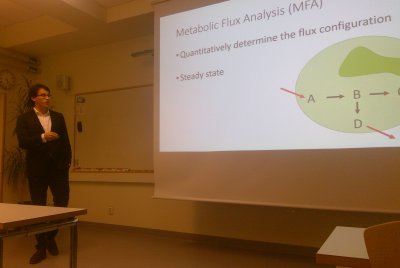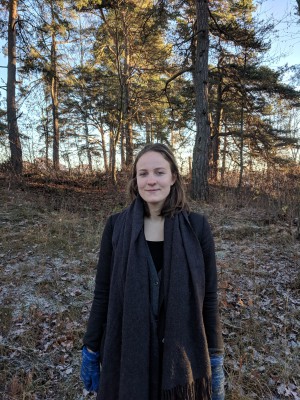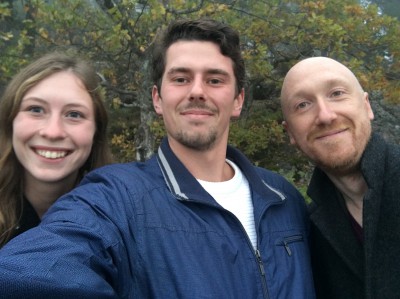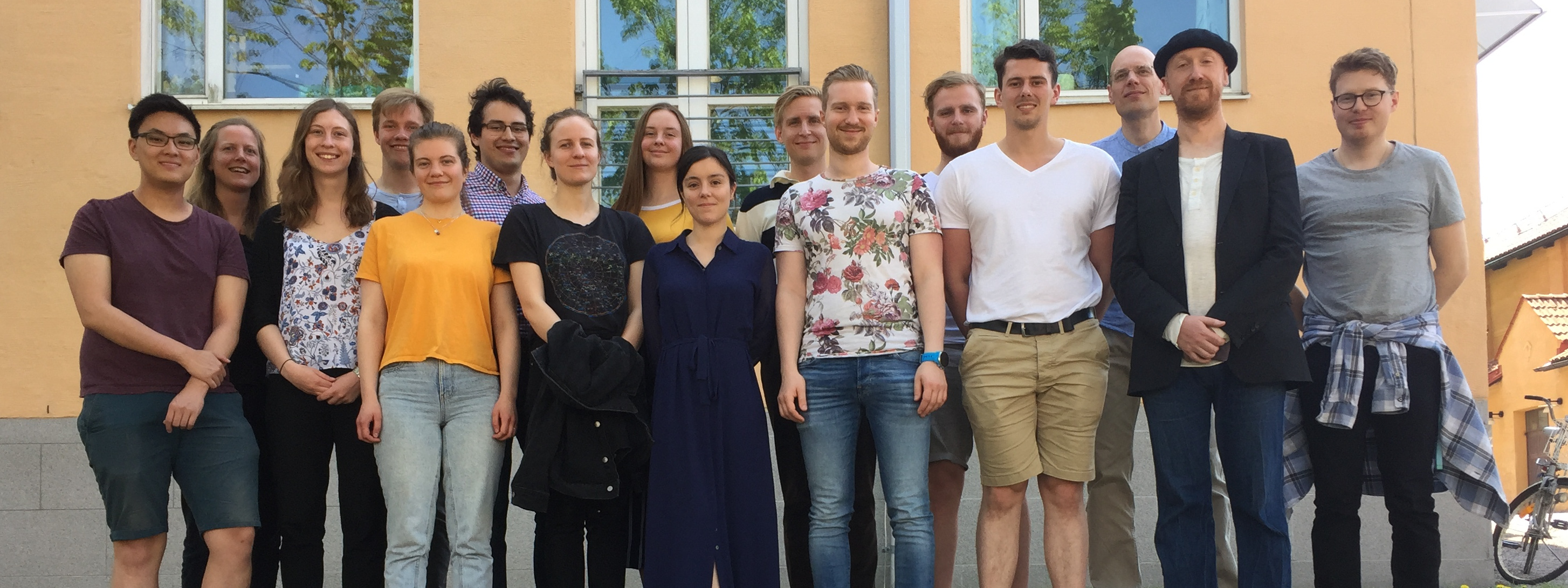This May, I (Tilda) was in Dublin for meetings with the Precise4q consortium. Check out the project here: https://precise4q.eu/. We presented our progress and discussed the coming EU review in Luxembourg this December. Next meeting will be here in Linköping this November. Stay tuned!
Precise4Q meeting in Dublin
Uncategorised Posted on Tue, October 01, 2019 16:36:52- Comments(0) https://blog.isbgroup.eu/?p=96
Ellen’s master thesis defence
Events Posted on Wed, January 23, 2019 14:53:04Today, Ellen
Lesshammar defended her master thesis project: ‘Mathematical modelling of TLR4-activated
macrophages in inflammation’. The project aimed to use a model-based approach to
investigate the synthesis and release of
cytokines from macrophages during inflammation and also when inflammatory
response is suppressed by anti-inflammatory drugs. The models Ellen constructed
have the potential of being further refined and extended to include other
aspects of inflammation and might thus hold the possibility to contribute to
the further understanding of inflammation and how it can be the root cause to
several common diseases.
The work was done here in the ISB-group but also at the
Linköping based company Wolfram MathCore. We would like to congratulate Ellen on a
job well done, and we wish her luck with all future endeavours!
- Comments(0) https://blog.isbgroup.eu/?p=5
Nicolas’s master thesis defence
Events Posted on Mon, December 03, 2018 14:56:21Nicolas’s master thesis
defence
Last week a member of our group held his master thesis defence. The
member in question was Nicolas who has been doing in his master thesis in our
group, as well as some work prior to that.
Nicolas hold a well-structured and informative presentation of his work
and defended his thesis in a great way.
Nicolas project aimed to characterize the metabolic fluxes of carbon-13
labelled metabolites throughout parts of the metabolic system. The fluxes were
determined from the structure of the metabolites in the end of the metabolic
system. By knowing the reactions in the system and the number of intermediate
products from the inserted labelled metabolites, one can determent the fluxes
between the reactions. This method is called metabolic flux analysis. Although
this is to hard math to do by hand, one can use mathematical modelling.
The second part of Nicolas project was to validate that his model could accurately
predict the quantities of the metabolic fluxes. However, today, there is no
established method for this kind of validation. Nicolas validated his model by the
model’s ability to predict a validation dataset, data that the model have not
seen before. By using this approach, one wish to see how the model react to new
data and judge the model quality by how true the model’s prediction of this
data is.
Additionally, the uncertainty of the predictions was analysed with a
profile likelihood analysis. With such predictions, one can place more trust in
fluxes determined by the model. Consequently, this allows for more challenging
issues to be tackled in the development process of new treatments.
With this we want to congratulate Nicolas on his completed master thesis
and wish good luck in the future.

- Comments(0) https://blog.isbgroup.eu/?p=6
New PhD student
News Posted on Wed, November 21, 2018 13:20:01Hello!
My name is Tilda and I have been in the isb
group before, but this November I started my phd here. I am financed by an EU
project called precise4Q. The project aims at personalising treatment of stroke
by developing model-based decision support systems. I will be working with combining
mechanistic multi-level models and machine learning models.
- Comments(0) https://blog.isbgroup.eu/?p=7
3th national diabetes summit
Events Posted on Wed, November 21, 2018 12:16:27
On November 16th and 17th Gunnar, Elin, William, Tilda, Christian, Kajsa and Jonna attended the 3th national diabetes summit in Stockholm. During
this conference the Karolinska institute was the scene of many interesting conversations,
posters and presentations.
The program consisted of many interesting presentations
covering various aspects of diabetes research. Our group was represented with,
apart from a poster, a very nice talk by Elin. We have had many interesting conversations
with other researchers that may lead to some very nice collaborations. For me
personally the conference was a unique chance to see what kind of diabetes
research is performed in Sweden.
Since the end of November is approaching rapidly my time in
Sweden is almost coming to an end. I look back at a very nice time in Sweden were
I’ve learned a lot about modeling and applications of modeling to the liver.
And of course my new knowledge about things like Fika and warm meals during
lunch 😉
Regards, Jonna
- Comments(0) https://blog.isbgroup.eu/?p=8
Ph.D defence of Belén Casas
Events Posted on Fri, November 16, 2018 13:19:11Last week we attended the Ph.D defence of Belén Casas, who has worked with our group during her research.
It was a pleasure to listen to the great presentation of her work and her defence. A short description about her work follows below.
Belén’s work aimed at improving the current diagnostic tools in the field of heart diseases. By analysing data gathered from using 4D flow-MRI (a technique with 3D time resolution and phase contrast magnetic resonance imaging) with mathematical models, Belén has developed tools that can be of help to improve a subject specific assessment of a patient’s cardiovascular function.
After a successful defence, there was a celebratory afterwork in Belén’s honour. We want to take our time to congratulate Belén to her well-deserved Ph.D title and wish her good luck in her future work.
Links to published articles
Briding the gap between measurment and modelling: a cardiovascular functional avatar

- Comments(0) https://blog.isbgroup.eu/?p=9
Retreat Liu Circ-M
Events Posted on Fri, October 12, 2018 14:59:02At the time of writing some members of the ISB-group (Henrik, Kajsa and Gunnar) just returned from attending the retreat of the research network CircM. Here they took part of presentations born from the network, one of which Gunnar took part in. Discussions of how the network can move forward with new ideas and challanges were also a part of the agenda.
We enjoyed the retreat, which took place outside Norrköping, and we are glad that we could take part of the presentations and discussions during the retreat.
Down below we leave you a link if you want to check out CircM and get into contact with the network.
https://liu.se/forskning/liu-circm
Regarding the picture down below, the wheater was unaccounted for, and an idea of a picture with Bråviken as background, turned out to be one with a nice forrest background instead. 
- Comments(0) https://blog.isbgroup.eu/?p=11
New student – Kajsa
News Posted on Tue, September 11, 2018 11:28:30Hi!
My name is Kajsa and I just finished my bachelor at the engineering biology
program. This autumn, and maybe the spring, I’m joining the research preparatory
course. I´m also teaching in a beginners programming course at campus Valla, so
I will spend some time there as well. In my spare time I like to stay active,
which includes everything from movie nights to climbing Sweden’s highest
mountain Kebnekaise.
Here in the
ISB group I will get the chance to continue with the project I was involved in during
the bachelor. In the bachelor project we created a new liver model describing
fatty acid conversion. Now, I will continue the work of the previous students
Valentin Kindesjö, Thirza Poot and Johanna Fridberger to put together a model
that describes fatty acid and glucose fluxes during the day and how it’s
affected by different factors such as insulin and cortisol. My main focus will
be at the fatty acid part and I will continue to work on my liver model as well
as Valentin’s adipose- and cortisol module, which all will be parts of the
bigger model.
I will also
look at newly published data on body fat distribution in connection to diseases
such as type 2 diabetes and coronary heart disease. A future goal is to connect
the data to our models and being able to describe how the fatty acid
homeostasis is affected by stress factors such as disturbed cortisol levels and
why this in some cases cause diseases. By doing this, we are getting closer to
simulating clinical studies and predicting diseases.

- Comments(0) https://blog.isbgroup.eu/?p=12

